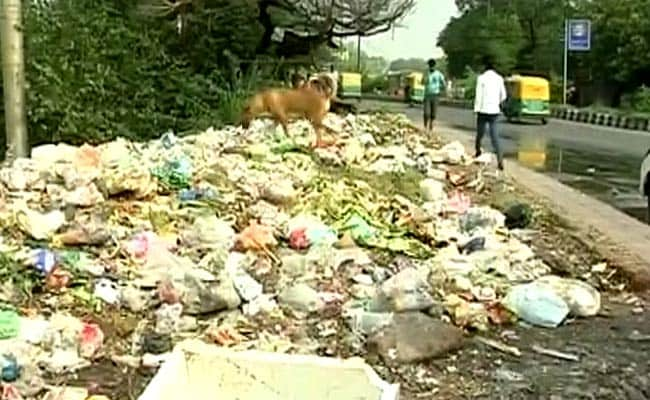
Officials blame high density of population and low funds for Delhis garbage crisis.
New Delhi:
New Delhi is scene to roads that are spic and span, and ranks 16 on the list of India's cleanest cities. But the rest of the megapolis stands a mere 100 from the bottom of the list of 476 compiled by the Ministry of Urban Development.
The list was a categorisation of Class 1 cities, those with a population of more than a lakh, on the basis of how clean they are. Delhi ranked a lowly 379.
The New Delhi Municipal Corporation (NDMC), which administers Lutyens's Delhi, home to the seat of most ministries and departments of the Union government and the residences of the country's high and mighty, says it has strengthened door-to-door collection. NDMC Medical Officer Dr PK Sharma also says garbage collection trucks visit every colony, and that residents' welfare associations had been enforced to play an inclusive role in the cleanliness drive.
NDMC manages a mere three percent of the entire megapolis of Delhi, with the situation not near as clean in the rest of the city, managed by the Municipal Corporation of Delhi (MCD).
Officials of the MCD say the areas it administers are more densely populated and have lesser funds. "There are a lot of unorganised and illegal colonies where awareness about waste management needs to be created. The locals and MCD workers need to work together towards a long-term drive. Our hands are tied when it comes to disposal of funds," says MCD South Delhi PRO Mukesh Yadav.
Chitra Mukherjee, manager of Chintan, an NGO that deals with environmental research and action, says, "The only way to stop this is to segregate at source and make sure plastics are reused and recycled." She adds that an inclusive and decentralised approach to waste management is the need of the hour.
The list was a categorisation of Class 1 cities, those with a population of more than a lakh, on the basis of how clean they are. Delhi ranked a lowly 379.
The New Delhi Municipal Corporation (NDMC), which administers Lutyens's Delhi, home to the seat of most ministries and departments of the Union government and the residences of the country's high and mighty, says it has strengthened door-to-door collection. NDMC Medical Officer Dr PK Sharma also says garbage collection trucks visit every colony, and that residents' welfare associations had been enforced to play an inclusive role in the cleanliness drive.
NDMC manages a mere three percent of the entire megapolis of Delhi, with the situation not near as clean in the rest of the city, managed by the Municipal Corporation of Delhi (MCD).
Officials of the MCD say the areas it administers are more densely populated and have lesser funds. "There are a lot of unorganised and illegal colonies where awareness about waste management needs to be created. The locals and MCD workers need to work together towards a long-term drive. Our hands are tied when it comes to disposal of funds," says MCD South Delhi PRO Mukesh Yadav.
Chitra Mukherjee, manager of Chintan, an NGO that deals with environmental research and action, says, "The only way to stop this is to segregate at source and make sure plastics are reused and recycled." She adds that an inclusive and decentralised approach to waste management is the need of the hour.
Track Latest News Live on NDTV.com and get news updates from India and around the world

